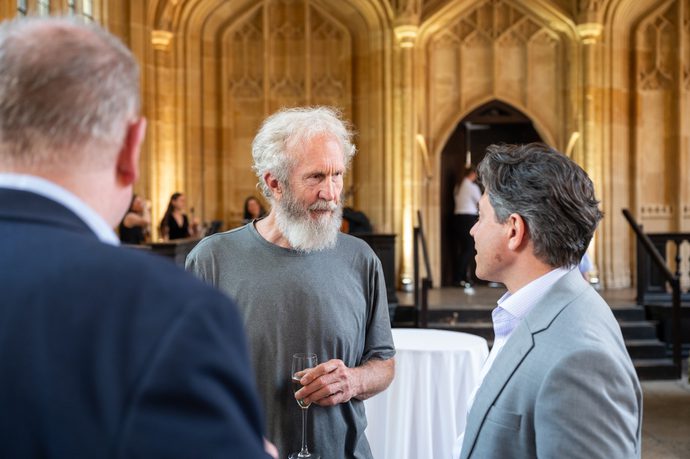The contribution of researchers at INET Oxford was recognised at an event to mark 20 years of the Oxford Martin School.
Held at the the Divinity School, the event was attended by the Chancellor William Hague, Vice Chancellor Irene Tracey and members of founder Dr. James Martin's family. Programme Directors J. Doyne Farmer, Cameron Hepburn, François Lafond and David Vines were present to represent INET Oxford.
From inequality and employment through to pandemics and the energy transition, a multi-disciplinary team of economics researchers at the Institute for New Economic Thinking at the Oxford Martin School have broken new ground over the past decade, changing the way their field can benefit humanity and the planet.
Covid-19
When the Covid-19 pandemic hit, Professor Doyne Farmer and the Complexity Economics team used powerful simulations to rapidly build a model that accurately predicted the impact on the UK economy, showing it is possible to make accurate predictions of an important economic event in real time. They further used the model to provide advice to the UK government on modifying lockdown policies to enable the economy to begin recovering while minimising health impacts.
Climate Policy
The Climate Policy Explorer, from the Climate Econometrics team, provides a rigorous and comprehensive analysis of which policies actually work in reducing carbon emissions. Using methods pioneered by Professor Sir David Hendry, the Explorer analyses over 1,500 climate policies from across the world, providing policymakers with valuable insights as to which combinations of policies would likely have the most impact in reducing emissions.
Renewable Energy
For decades, the economic and political narrative has been that a transition to clean energy will mean higher energy prices and reduced growth. A team led by Professor Doyne Farmer with Dr François Lafond, and Dr Rupert Way of the Economics of Sustainability team, found that traditional forecasting methods had significantly underestimated the cost declines in renewable energy. An improved, empirically-based forecasting method developed by the team showed the world could save $12 trillion by switching to 100% clean energy technologies by 2050. This work has had a major policy impact, supporting efforts in the UK, US and EU to accelerate the energy transition.
Inequality
Work by Professor Brian Nolan and the Economics, Inequality and Opportunity team has helped change the dominant economic and political narrative on inequality, from an acceptance that it is governed by market forces to an awareness that economic policy choices significantly impact living standards and economic mobility. The group has worked on innovative policy solutions, including a guaranteed job scheme in Austria that successfully reduced long-term unemployment and has inspired other pilot projects supported by the European Parliament.

"Our researchers are radically re-thinking economics, pioneering new methods to address urgent real-world challenges. I'm incredibly proud of the breakthroughs our team has made and of the valuable insights their work is providing for governments and economic policymakers around the world." Eric Beinhocker, Executive Director (INET Oxford)

"Twenty years on, we continue to reap the benefit of James Martin's generosity and vision. The University is immensely proud of the Oxford Martin School, which supports such a diverse range of research, staying faithful to the original challenge of finding solutions to the biggest challenges of our time by working in a truly interdisciplinary manner. It is a mission that was ahead of its time, but which continues to inspire." Professor Irene Tracey, Vice-Chancellor, University of Oxford

"The Oxford Martin School backs high-risk, high-reward research. It has changed the University, bringing together groups that have not previously collaborated, and linking our researchers with those in government and other organisations who use our research to create real change." Professor Sir Charles Godfray, Director, Oxford Martin School
Key links









